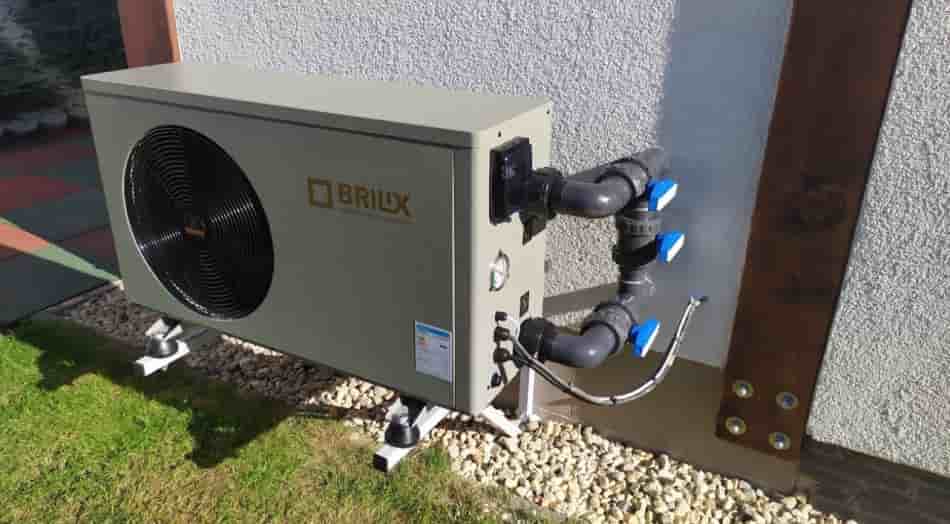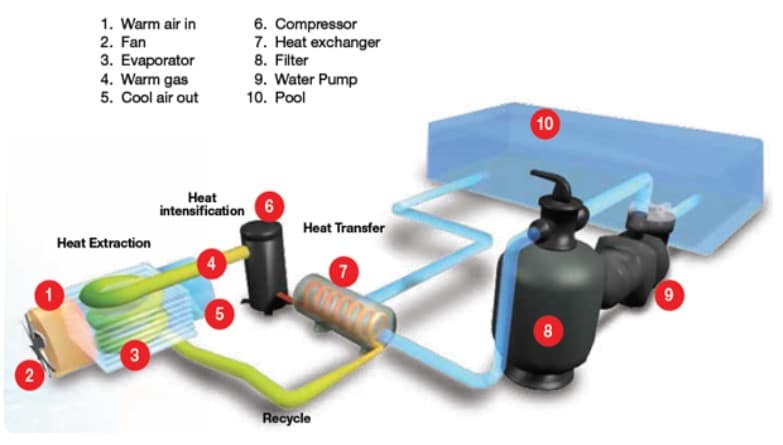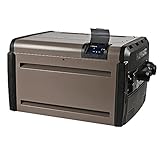Looking for an efficient and eco-friendly way to heat your swimming pool? Discover the benefits of a heat pump for swimming pools. Keep your pool warm all year round while reducing energy costs. Find the perfect heat pump for your pool today!
Heat Pump for Your Swimming Pool
A heat pump for a swimming pool is an efficient and cost-effective way to heat the water. It works by extracting heat from the surrounding air and transferring it to the pool water, effectively raising its temperature.

Heat pumps are a popular choice for pool heating because they use renewable energy sources, such as air or ground heat, to heat the water. A heat pump for a swimming pool is an efficient and cost-effective way to heat the water. It works by.
How to Select a heat pump for Your Swimming Pool?
Here are a few key points to consider when selecting a heat pump for your swimming pool:
- Size and Capacity: The size and capacity of the heat pump should be chosen based on the size of your pool. A larger pool will require a more powerful heat pump to ensure efficient heating.
- Energy Efficiency: Look for a heat pump with a high coefficient of performance (COP). The COP indicates the heating efficiency of the pump, with higher numbers indicating greater efficiency. Choosing an energy-efficient heat pump will help reduce operating costs.
- Climate Considerations: The climate in your area plays a role in determining the effectiveness of a heat pump. Heat pumps work best in moderate climates, where the ambient air temperature remains above freezing. If you live in a colder region, you may need a heat pump specifically designed for colder climates or consider alternative heating options.
- Durability and Warranty: Check the durability and reliability of the heat pump you’re considering. Look for models with good reviews and a warranty that covers both parts and labor. This ensures you have support in case of any issues.
- Installation and Maintenance: Consider the installation requirements and maintenance needs of the heat pump. Some models may require professional installation, while others can be easily set up by the pool owner. Regular maintenance, such as cleaning the air filters and inspecting the system, is essential to keep the heat pump running efficiently.
- Cost: Compare the initial cost, operating costs, and long-term savings of different heat pump models. While heat pumps may have a higher upfront cost compared to other heating methods, they are generally more energy-efficient, which can lead to long-term savings on utility bills.
How Does a Pool Heat Pump Work?
A pool heat pump works by utilizing a step-by-step process to heat your swimming pool efficiently. Here’s how it works:

- Air Intake: The heat pump draws in ambient air from the surrounding environment using a fan.
- Heat Absorption: The air passes through an evaporator coil containing a refrigerant. The refrigerant absorbs the heat from the air, which causes it to evaporate into a gas.
- Compression: The gaseous refrigerant is compressed by a compressor, increasing its temperature and pressure.
- Heat Exchange: The hot refrigerant gas flows through a heat exchanger, transferring its heat to the cooler pool water circulating through the exchanger.
- Condensation: As the heat is transferred to the pool water, the refrigerant condenses back into a liquid state.
- Expansion: The condensed refrigerant flows through an expansion valve, reducing its pressure and temperature.
- Repeat Cycle: The process repeats, with the refrigerant absorbing heat from the air, compressing, transferring heat to the pool water, and then expanding again.
- Warm Pool Water: The heated pool water is then returned to the pool, raising its temperature to a comfortable level.
Can a Heat Pump Heat a Swimming Pool?
Yes, a heat pump can heat a swimming pool efficiently. It transfers heat from the air, ground, or water source to the pool water using a refrigeration cycle. The warmed water is circulated back into the pool, raising its temperature. Heat pumps are energy-efficient with a high coefficient of performance (COP). The efficiency depends on factors like outdoor temperature and heat pump size. In colder regions, a heat pump designed for colder climates or alternative heating methods may be needed. Overall, a heat pump is a great option for extending the swimming season with comfortable water temperatures.
What Size Heat Pump Do I Need for My Pool?
To determine the size of the heat pump you need for your pool, there are a few key factors to consider:
- Pool Size: The size of your pool is a crucial factor in determining the heat pump size. The larger the pool, the more heat output you’ll require to effectively raise and maintain the desired water temperature. Pool size is typically measured in gallons or cubic meters.
- Desired Temperature Increase: Consider the temperature increase you want to achieve in your pool. If you live in a colder climate or prefer a higher pool temperature, you’ll need a heat pump with a higher heating capacity.
- Climate: The climate in your area also plays a role in determining the size of the heat pump. If you live in a region with colder average temperatures, you’ll need a larger heat pump to compensate for the increased heat loss.
- Heat Loss Factors: Evaluate the heat loss factors
 specific to your pool. Factors such as evaporation, wind exposure, and insulation levels can affect the heat loss from your pool. The more heat loss your pool experiences, the larger the heat pump you’ll need to counteract it.
specific to your pool. Factors such as evaporation, wind exposure, and insulation levels can affect the heat loss from your pool. The more heat loss your pool experiences, the larger the heat pump you’ll need to counteract it. - Efficiency and Performance: Consider the energy efficiency and performance of the heat pump models you’re considering. Look for heat pumps with a high coefficient of performance (COP) to ensure efficient heating and cost savings over time.
To get a more accurate estimate of the heat pump size for your pool, it’s recommended to consult with a professional pool heater installer or a reputable pool equipment supplier. They can assess your pool’s specific requirements and provide recommendations based on factors such as pool size, location, and climate.
How Much is a Heat Pump to Heat a Pool?
The cost of a pool heat pump varies based on pool size, desired temperature increase, climate, brand, and features. Prices range from a few hundred to several thousand dollars. Installation, electricity consumption, and maintenance are additional costs. Consider long-term energy savings when choosing a heat pump. Contact suppliers for accurate quotes based on your pool’s specifications.
5 Best Heat Pump for Swimming Pool
Best Gas Pool Heater for Inground Pools: The Hayward Dual Fuel Pool Heater
The Hayward Dual Fuel Pool Heater is a versatile and energy-efficient option for pool owners. It operates on either natural gas or propane, providing flexibility in fuel choices. Its user-friendly interface and digital display allow for easy temperature control. The heater quickly heats the pool and maintains desired temperatures effectively. With advanced safety features, it ensures worry-free operation. The Hayward Dual Fuel Pool Heater offers reliable performance and is an excellent choice for those seeking a durable and adaptable pool heating solution.

- BEST FOR: In-ground pools and spas with a surface area up to 1,200 ft. where natural gas is available. Its low environmental impact makes it ideal for pools and spas located where low-NOx emissions are required.
- PREMIUM PERFORMANCE: The Hayward Universal H-Series 400,000 BTU Propane Heater delivers premium heating performance for years of reliable, long-lasting comfort.
- CORROSION PROTECTION: The Universal H-Series boasts exceptional protection against corrosion and premature failure caused by unbalanced water chemistry.
- ENERGY SAVINGS: The efficient, industry-leading design reduces circulation pump run time to provide energy savings.
- EASY-TO-USE: Intuitive front control panel provides easy operation, service and maintenance.
| Pros | Cons |
| Dual Fuel Capability: Allows for the use of either natural gas or propane, providing flexibility in fuel options based on availability and cost. | Initial Cost: The Hayward Dual Fuel Pool Heater may have a higher upfront cost compared to some other pool heaters on the market. |
| Versatile: Can be used in various locations with different fuel availability, making it adaptable to different environments. | Installation: Proper installation may require professional assistance, adding to the overall cost. |
| User-Friendly Controls: Intuitive interface and digital display make it easy to operate and adjust temperature settings. | Maintenance: Regular maintenance, including periodic servicing and cleaning, is necessary to ensure optimal performance and longevity. |
| Efficient Heating Performance: Delivers quick heating and effectively maintains desired pool temperatures, ensuring optimal comfort. | |
| Durable Construction: High-quality components and robust construction ensure durability and long-lasting performance. | |
| Advanced Safety Features: Automatic shut-off system and sturdy combustion chamber design enhance safety during operation. |
Best Gas Pool Heater for Above Ground Pools: The Hayward H-Series Natural Gas Heater
The Hayward H-Series Natural Gas Heater exceeded my expectations with its reliable performance and user-friendly features. It quickly heats my pool to the desired temperature, and the digital control panel is easy to navigate. The heater’s durable construction and advanced safety features give me confidence in its longevity and safe operation. Installation was straightforward, and I highly recommend this top-notch heating solution for any pool owner in need of an efficient and effective pool heater.

- BEST FOR: In-ground pools and spas with a surface area up to 750 ft. where natural gas is available. Its low environmental impact makes it ideal for pools and spas located where low-NOx emissions are required.
- PREMIUM PERFORMANCE: The Hayward Universal H-Series 250,000 BTU Natural Gas Heater delivers fast premium heating performance for years of reliable, long-lasting comfort.
- CORROSION PROTECTION: The Universal H-Series boasts exceptional protection against corrosion and premature failure caused by unbalanced water chemistry.
- ENERGY SAVINGS: The efficient, industry-leading design reduces circulation pump run time to provide energy savings.
- EASY-TO-USE: Intuitive front control panel provides easy operation, service and maintenance.
| Pros | Cons |
| Efficient heating: The Hayward H-Series Natural Gas Heater quickly and effectively heats up pools for a comfortable swimming experience. | Natural gas dependency: Requires access to a natural gas supply, limiting usability in some areas. |
| User-friendly design: Easy-to-navigate control panel and clear display make temperature adjustments and settings customization a breeze. | Installation complexity: Some users may find the installation process slightly challenging. |
| Cost-effective operation: Operates on natural gas, offering long-term energy efficiency and potential savings. | Higher upfront cost: Initial investment may be higher compared to other pool heating options. |
| Durable construction: Built to withstand harsh weather and regular usage, ensuring longevity and reliability. | Carbon emissions: As a natural gas-powered heater, it produces carbon emissions during operation. |
| Advanced safety features: Robust ignition system and pressure switch provide added safety during operation. |
FAQs
Is a heat pump for a pool worth it?
The worth of a pool heat pump depends on several factors. In moderate to warm climates with frequent pool use, it can extend the swimming season and maintain consistent water temperatures. Heat pumps are energy-efficient, leading to potential cost savings over time. However, in colder climates, other heating options may be more suitable. Assess your needs, climate, and pool usage to decide if a heat pump is a worthwhile investment for you.
Can a heat pump heat a swimming pool?
Yes, a heat pump can effectively heat a swimming pool. Heat pumps use electricity to transfer heat from the surrounding air or ground and transfer it to the pool water. By utilizing this heat transfer process, the heat pump raises the temperature of the pool water, providing comfortable swimming conditions.
What size heat pump do I need to heat my pool?
Determining the appropriate size of a heat pump to heat your pool depends on several factors, including the pool’s size, desired water temperature, climate, and insulation of the pool. Generally, heat pumps are sized based on their BTU (British Thermal Unit) output, which indicates their heating capacity.
How much is a heat pump to heat a pool?
Generally, the price range for a heat pump suitable for pool heating can start from a few thousand dollars and go up significantly depending on the specific requirements. It’s recommended to research and compare different heat pump options, considering their efficiency, features, and warranties, to find one that aligns with your budget and heating needs.
Conclusion
A heat pump for pool heating is an efficient and popular option for extending the swimming season and maintaining comfortable water temperatures. It utilizes electricity to transfer heat from the surrounding air or ground to heat the pool water. The size of the heat pump needed depends on factors such as pool size, desired temperature, climate, and insulation. While prices can vary based on these factors and the brand/model chosen, heat pumps generally range from a few thousand dollars upwards. It’s advisable to research and compare options, considering efficiency, features, warranties, and installation costs to find the most suitable heat pump for your pool heating needs.


